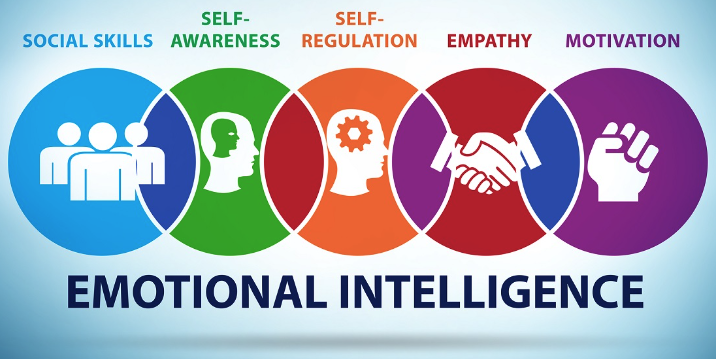Leadership success is often attributed to a variety of factors such as intelligence, knowledge, and experience. However, one crucial aspect that is often overlooked is emotional intelligence. Emotional intelligence refers to the ability to recognize, understand, and manage our emotions and those of others. In recent years, it has emerged as a key determinant of effective leadership. Today we explore the concept of emotional intelligence and its significance in achieving leadership success.

Understanding Emotional Intelligence
Emotional intelligence encompasses various components that contribute to effective leadership. These components include self-awareness, self-regulation, empathy, social skills, and motivation. Let’s delve deeper into each of these aspects and explore how they influence leadership success.
Self-Awareness: The Foundation of Emotional Intelligence
Self-awareness involves understanding our emotions, strengths, weaknesses, and the impact we have on others. Leaders with high self-awareness are conscious of their emotions and how they influence their decision-making and interactions. They have a clear understanding of their values and goals, which allows them to lead with authenticity and integrity.
By being self-aware, leaders can better understand their own limitations and seek personal growth and development. They can also anticipate how their actions and decisions might affect their team, enabling them to make more informed choices.
Self-Regulation: Controlling Emotions for Optimal Leadership
Self-regulation refers to the ability to manage and control one’s emotions, impulses, and reactions. Leaders with strong self-regulation can remain composed and think rationally, even in stressful or challenging situations. They exercise restraint and avoid making impulsive decisions that could have negative consequences.
Effective self-regulation also involves acknowledging and learning from mistakes. Leaders who can reflect on their actions and make necessary adjustments demonstrate resilience and foster a culture of continuous improvement within their teams.
Empathy: Understanding and Valuing Others
Empathy is the ability to understand and share the feelings of others. Leaders who possess empathy can connect with their team members on a deeper level. They actively listen to their concerns, demonstrate understanding, and validate their emotions. By doing so, they create an inclusive and supportive work environment, where individuals feel valued and motivated.
Empathetic leaders also take into account the diverse perspectives and experiences of their team members, promoting collaboration and creativity. They are adept at recognizing and managing emotions in others, which allows them to provide meaningful support and guidance.
Social Skills: Building Strong Relationships
Leaders with strong social skills excel at building relationships, fostering teamwork, and resolving conflicts. They communicate effectively, both verbally and non-verbally, and possess the ability to inspire and motivate others. They are approachable, open to feedback, and create an atmosphere that encourages constructive dialogue.
These leaders excel at networking and developing partnerships, which can be valuable for organizational growth and success. By cultivating positive relationships, they create a sense of belonging and loyalty within their team, resulting in increased engagement and productivity.
Motivation: Inspiring and Driving Performance
Motivation plays a pivotal role in leadership success. Leaders who are self-motivated and possess the ability to inspire and motivate others foster a culture of high performance. They set ambitious goals, create a compelling vision, and align their team members’ aspirations with organizational objectives.
Motivated leaders lead by example and demonstrate enthusiasm and passion for their work. They empower their team, providing them with autonomy and opportunities for growth and development. By fostering a sense of purpose and creating a positive work environment, they drive individual and collective success.
The Impact of Emotional Intelligence on Leadership Success
Leaders who possess high emotional intelligence are more likely to achieve success in their roles. Here are some ways in which emotional intelligence influences leadership effectiveness:
- Enhanced Communication: Emotional intelligence enables leaders to communicate effectively, fostering clarity, understanding, and trust among team members. This results in improved collaboration and productivity.
- Conflict Resolution: Leaders with high emotional intelligence can navigate conflicts and disagreements constructively. They are skilled at resolving conflicts and finding win-win solutions that maintain relationships and promote team cohesion.
- Adaptability: Emotional intelligence enables leaders to adapt to change and navigate uncertain situations with resilience. They can effectively manage the emotions of their team members during times of transition, fostering a smooth and successful transformation.
- Employee Engagement: Leaders who exhibit emotional intelligence create an environment where employees feel valued, supported, and motivated. This boosts employee engagement and reduces turnover, resulting in a more productive and loyal workforce.
- Decision-Making: Leaders with emotional intelligence can make more informed and balanced decisions by considering the impact on individuals and teams. They can also manage their own biases and emotions, leading to more objective and effective decision-making.
Conclusion
Emotional intelligence is a vital skill set for leaders seeking success in today’s complex and dynamic world. By developing and nurturing emotional intelligence, leaders can foster positive relationships, inspire their teams, and drive organizational success. Recognizing the importance of emotional intelligence and investing in its development will undoubtedly be the secret ingredient for leadership success. As the saying goes, “Great leaders don’t just lead with their minds; they lead with their hearts.”


